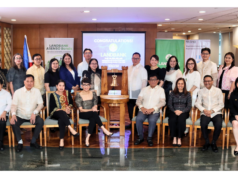“THE STATE shall protect and advance the right of the people to a balanced and healthful ecology in accord with the rhythm and harmony of nature.”
Invoking Section 16, Article 11 of the 1987 Philippine Constitution, Pampanga 3rd District Rep. Aurelio “Dong” Gonzales Jr. launched his own war against non-biodegradable plastics with House Resolution 783.
“The use of plastics is one of the causes of ecological degradation, the same being non-biodegradable; the use of plastic bags as packing materials of goods sold by business establishments can be attributed as one main factor in the environmental problems we are facing,” Gonzales said in his explanatory notes.
Furthered the solon: “The recent flooding in many areas of the country, particularly Metro Manila, has again highlighted the precarious balance and status of our environment…One does not have to go out and search for evidence of men’s neglect of the environment. The clogged esteros in every corner of cities in Metro Manila and other urban areas will bear witness to this fact.”
Closer to home, the flash floods that regularly visit the City of San Fernando – despite the herculean efforts of city flood czar Marni Castro – have been attributed to creeks, canals and other waterways perennially clogged with plastic wastes; Sapang Balen in Angeles City, notwithstanding the curse put by Bishop Ambo David on those throwing garbage onto the creek, is clogged too with plastic; the open dumpsites in practically all the Pampanga towns have two uniform features: the stench and discarded plastic wastes.
Grounded “on the concept of sacrificing some of our convenience for the sake of Mother Earth,” House Resolution 783 provides for the phase-out of plastic bags as packing materials of goods sold or disposed by sari-sari stores, market vendors, department stores, and similar establishments, prescribing penalties therefore, and for other purposes.
The solon was quick to point out though that the bill should be construed as “not the answer, but a practical contribution in our collective efforts to the many demands and needs to solve our environmental problems.”
The bill mandates the prohibition of the use of non-biodegradable plastic bags as packing materials of goods after the phase-out period as determined by the resolution, two years after its effectivity.
Only biodegradable plastics and other such materials – as approved by the Department of Environment and Natural Resources – shall be permitted to be used.
The bill also mandates the Department of Science and Technology to assist plastic manufacturers in acquiring the appropriate technology required in the production of biodegradable plastic bags.
Corollary, nay, complementary to this will be the return of the old bayong and tiklis for all marketing needs.
Once enacted into law, violators shall be fined P500 for the first offense; P700 for the second offense; and P1,000 plus suspension of the business permit for a period of 30 calendar days for the third offense.
With House Resolution 783, Gonzales has given real substance to his chosen campaign color: green – living, refreshing, nurturing green.
Greenies, unite! This bill is truly deserving of the people’s support.
Invoking Section 16, Article 11 of the 1987 Philippine Constitution, Pampanga 3rd District Rep. Aurelio “Dong” Gonzales Jr. launched his own war against non-biodegradable plastics with House Resolution 783.
“The use of plastics is one of the causes of ecological degradation, the same being non-biodegradable; the use of plastic bags as packing materials of goods sold by business establishments can be attributed as one main factor in the environmental problems we are facing,” Gonzales said in his explanatory notes.
Furthered the solon: “The recent flooding in many areas of the country, particularly Metro Manila, has again highlighted the precarious balance and status of our environment…One does not have to go out and search for evidence of men’s neglect of the environment. The clogged esteros in every corner of cities in Metro Manila and other urban areas will bear witness to this fact.”
Closer to home, the flash floods that regularly visit the City of San Fernando – despite the herculean efforts of city flood czar Marni Castro – have been attributed to creeks, canals and other waterways perennially clogged with plastic wastes; Sapang Balen in Angeles City, notwithstanding the curse put by Bishop Ambo David on those throwing garbage onto the creek, is clogged too with plastic; the open dumpsites in practically all the Pampanga towns have two uniform features: the stench and discarded plastic wastes.
Grounded “on the concept of sacrificing some of our convenience for the sake of Mother Earth,” House Resolution 783 provides for the phase-out of plastic bags as packing materials of goods sold or disposed by sari-sari stores, market vendors, department stores, and similar establishments, prescribing penalties therefore, and for other purposes.
The solon was quick to point out though that the bill should be construed as “not the answer, but a practical contribution in our collective efforts to the many demands and needs to solve our environmental problems.”
The bill mandates the prohibition of the use of non-biodegradable plastic bags as packing materials of goods after the phase-out period as determined by the resolution, two years after its effectivity.
Only biodegradable plastics and other such materials – as approved by the Department of Environment and Natural Resources – shall be permitted to be used.
The bill also mandates the Department of Science and Technology to assist plastic manufacturers in acquiring the appropriate technology required in the production of biodegradable plastic bags.
Corollary, nay, complementary to this will be the return of the old bayong and tiklis for all marketing needs.
Once enacted into law, violators shall be fined P500 for the first offense; P700 for the second offense; and P1,000 plus suspension of the business permit for a period of 30 calendar days for the third offense.
With House Resolution 783, Gonzales has given real substance to his chosen campaign color: green – living, refreshing, nurturing green.
Greenies, unite! This bill is truly deserving of the people’s support.




